France in the firing line of 'new jihad'
- Published
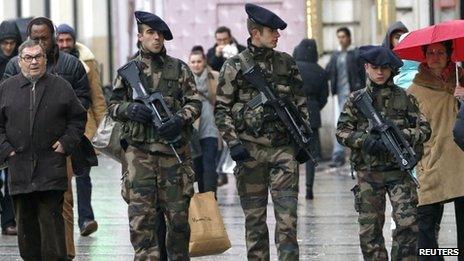
France stepped up internal security measures following its action in Mali
France is enemy number one for the jihadists in North Africa, according to one of the country's leading counter-terrorist judges.
Marc Trevidic told the BBC that jihadists had already been heading out to Mali and that French intervention would heighten the risk of lone wolf attacks in France.
However, he said the deployment of the French military was necessary to counter the dangers from Mali falling into the hands of extremists.
As a counter-terrorist judge, Marc Trevidic directs police and security service investigations into terrorist activity, building the cases against those to be prosecuted. It gives him a unique vantage point into recent events in North Africa.
Struggle for dominance
The ambition of the operation against the Algerian gas facility was a surprise, he says, but not the identity of the man behind the attack.
Mokhtar Belmokhtar has been on the radar of the French authorities for many years.
"He tried to recruit many French citizens in the past to make bomb attacks in France. So we have cases in connections with him," Mr Trevidic says.
He says that Belmokhtar's group only numbered 200-300 in 2003 but it has grown in wealth and influence thanks to trafficking and ransoms derived from kidnaps, allowing it to buy allies as well as arms.
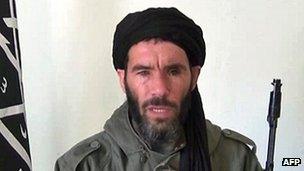
Mokhtar Belmokhtar has previously tried to recruit French nationals, Mr Trevidic says
Belmokhtar fell out with the leadership of Al-Qaeda in the Islamic Maghreb (AQIM) after the death of Osama Bin Laden and a struggle for dominance has been going on.
The attack in Algeria was part of this, Mr Trevidic believes. "I think he wanted to take the leadership of the jihad in the area," he argues. "Belmokhtar knows perfectly well that the Algerian authorities never negotiate - never. So he took a big risk.
"In his mind, he saw that it was a spectacular action and there was no way of avoiding the blood. But it was what he wanted."
'New jihad'
The French judge - who has been working on terrorism cases since 2000 - has no doubt that France is in the firing line of the jihadists.
"We are the enemy number one for them. There is a new jihad in Mali…. And there is another problem - we have a lot of connections between France and the population in this area - Malians, Nigerians, Senegalese."
In the last six to eight months, Mr Trevidic has run a series of investigations looking at individuals travelling from France to Mali to take part in jihad.
These individuals often then encourage their friends to join them. The small groups often begin with individuals with a North African background but then extend to their wider contacts.
Mr Trevidic says he has been surprised by the youthfulness of some of those involved, with some aged only 16 or 17.
He says there is no large, unified network organising people to be sent to Mali and the challenge will be cutting some of those pathways to prevent others joining them.
Immediate decision
Many had been preparing to do battle with foreign forces when they arrived later in the year but France's surprise military deployment this month has only intensified jihadist appeals for others to join them.
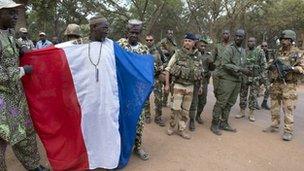
Mr Trevidic argues that France's intervention in Mali was necessary
Mr Trevidic believes the French authorities will be able to keep track of most of those who they have identified as travelling to Mali.
"When they want to come back, we will be there," he says.
But there is still a threat.
He believes Belmokhtar is trying to inspire individual jihadists to carry out their own attacks, much like those by Mohamed Merah, who carried out a shooting spree around Toulouse last year.
"Belmokhtar [is] not able to build a big group to attack France," argues Mr Trevidic. "So he said, 'you are already in France do what you can. Do the jihad by yourselves. Fight France by all means you can find.'"
Despite the heightened threats to the country, Mr Trevidic says France was right to intervene in Mali.
"France didn't want to go alone in the beginning in Mali but it had no choice. Because can you imagine all these Islamic groups in Bamako?
"It is impossible to deal with that after. Two million inhabitants in Bamako. Little streets. Little souks. What are you going to do? It is easier to fight when they are in the desert in pickups. So it was a decision that had to be taken immediately."
The rise of Islamist militants in the Sahara
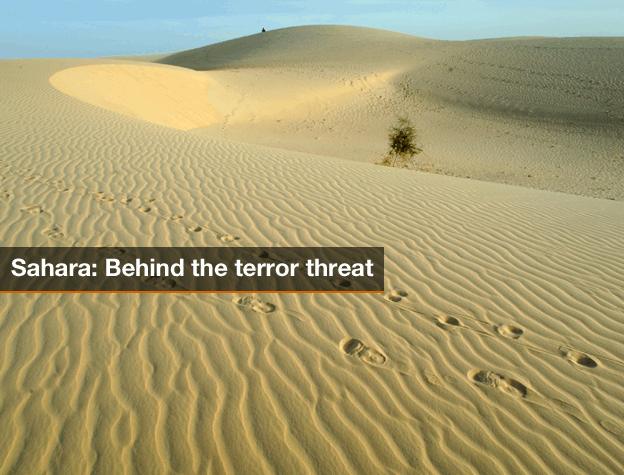
Following the recent attack on an Algerian gas plant, UK Prime Minister David Cameron says that the Sahara desert has turned into a haven for militant Islamists who are waging a jihad against the West. He says it will take decades to defeat them.
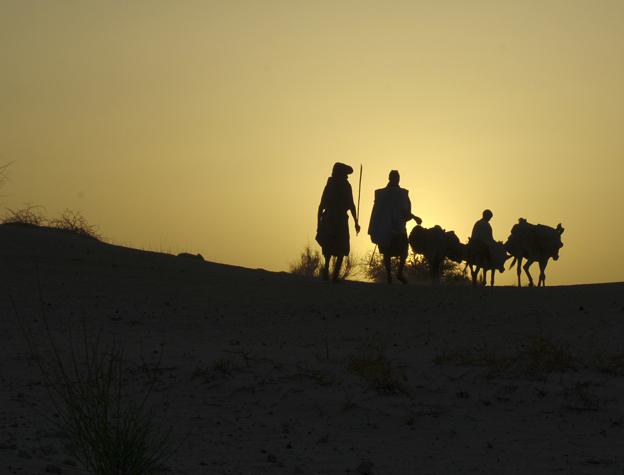
The Sahara used to be a thriving economic zone, famed for its long camel caravans laden with salt, which in the Middle Ages was said to be worth more than gold. But times - and trade routes - have changed and now the countries on the desert's southern fringes, mainly ex-French colonies, are among the world's poorest.
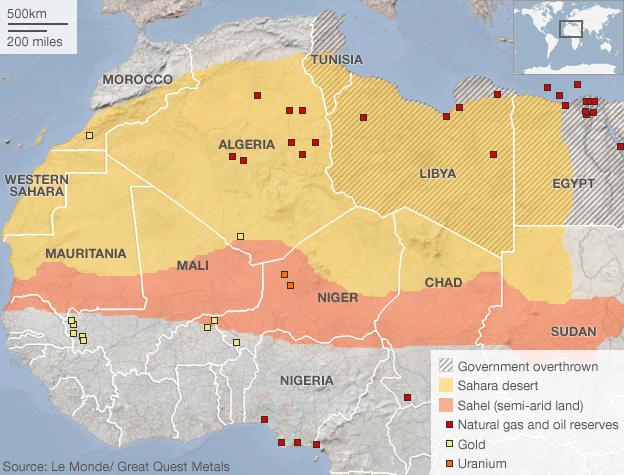
Although most of the desert's inhabitants are poor, there are rich natural resources to be found under the sands. Algeria has oil and gas, Niger has one of the world's largest uranium reserves, which power France's nuclear plants. Mali is Africa's third biggest gold producer.
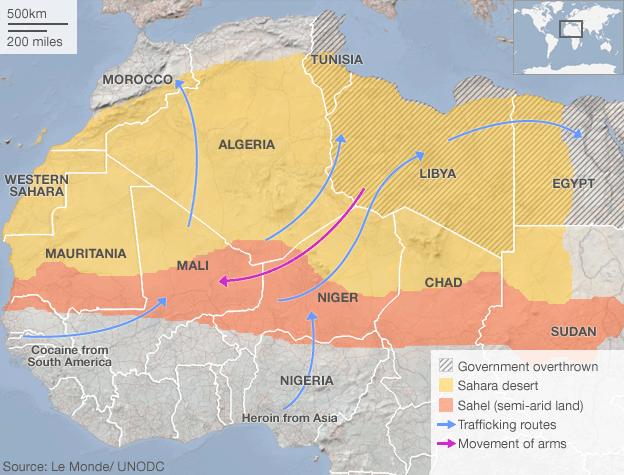
Some of the region's inhabitants have used their desert knowledge for criminal purposes - smuggling migrants and drugs along ancient routes to Europe. Some jihadists have used the profits to buy arms. When Col Gaddafi was toppled in Libya in 2011, many Tuareg fighters returned to Mali and started a rebellion.
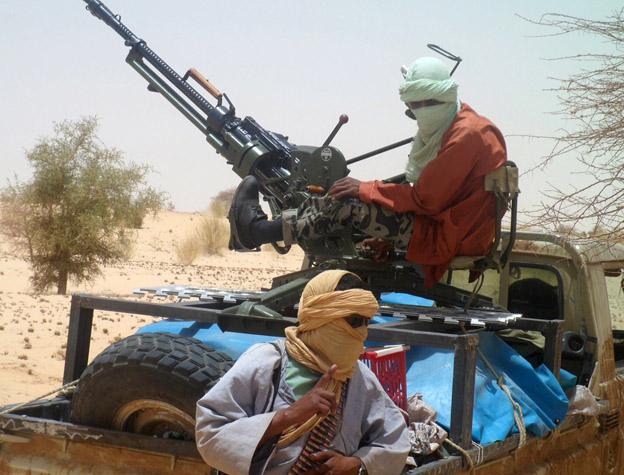
The Tuareg rebels joined forces with Islamists who had been expelled from Algeria in the 1990s and had spread across the Sahara, forging links with al-Qaeda and staging attacks in all of the region's countries. In April 2012, the new alliance quickly seized northern Mali - an area larger than France.
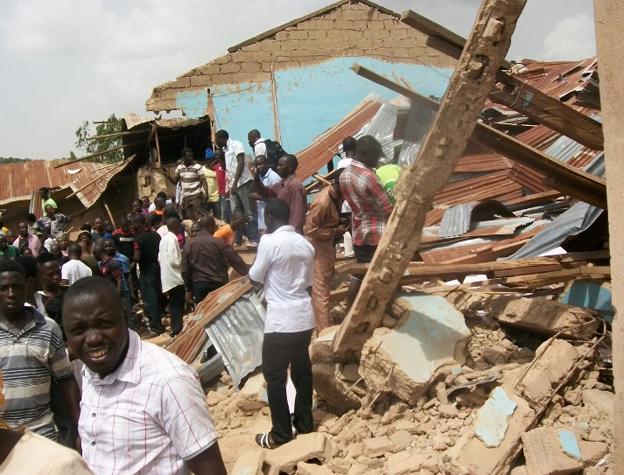
Numerous armed groups operate in the Sahara - with a mix of motivations from making money, to self-rule to global jihad. It is hard to know to what extent they work together. There are reports that other militant groups such as Nigeria's Boko Haram and Somalia's al-Shabab have links to the Saharan jihadists.
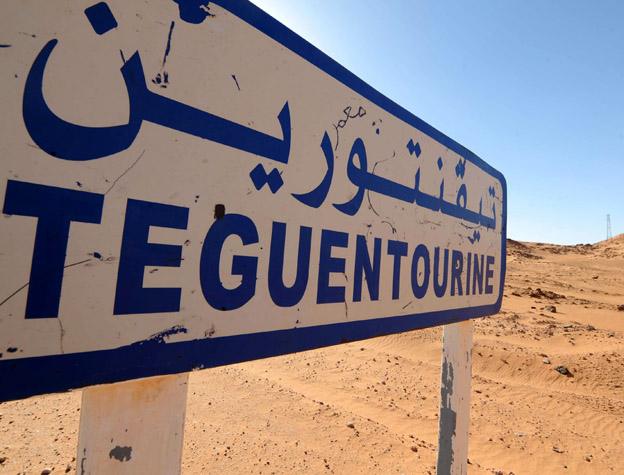
The militants who attacked the gas facility in Algeria are said to have been from countries across the region. Many Saharans share strong family and cultural ties with residents of the desert in other countries and see the desert as a single vast area rather than parts of several different national territories.
- Published19 January 2013
- Published14 January 2013
- Published18 January 2013